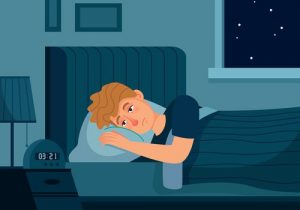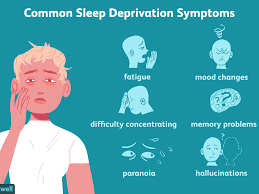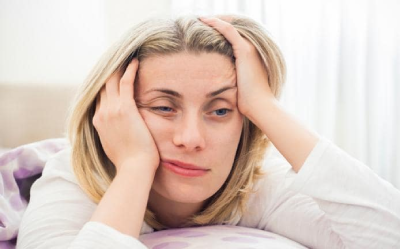Table of Contents
What is Sleep Deprivation?
Insufficient sleep or sleeplessness is called sleep deprivation when we don’t get enough rest to feel aware and relaxed. It is a terrible condition impacting the standard of living, destroying our wellbeing, satisfaction and financial capital. A persistent, sleep-restricted condition can lead to clumsiness, expensive infections, acute weakness, daytime sleepiness, and increased appetite resulting in obesity. This may also cause absenteeism and injuries in the workplace.
Sleep deprivation is like one of the most common problem in society today which leads to many health problems. This occurs when an person is experiencing sleep cycle disturbance by staying awake for different reasons. Kids, adults and the elderly are all vulnerable to the effects of sleep deprivation. In far-reaching and unexpected ways, sleep deprivation significantly affects your physical well-being, mental health, memory , mood etc.
Occasional shifts in sleep habits are not usually of concern. Nevertheless, prolonged insufficiency of sleep can lead to low productivity, lack of concentration, excessive daytime sleepiness, obesity, emotional difficulties, poor job performance and a diminished understanding of the standard of life.

Some quick facts on Sleep deprivation
- Ability to focus on environment sensory inputs is disrupted by sleep deprivation.
- Children and teenagers are the groups more prone to adverse effects of sleep deprivation.
- Major Reason behind some tragic accidents has been sleep deprivation and the resulting lack of focus.
- Sleep Deprivation in itself can be a symptom of some other disorder that hasn’t been diagnosed yet or any other medical issue.
Causes of Sleep Deprivation
- Health conditions – Issues such as bad headache, respiratory infection, or even pregnancy. Certain psychological conditions that can find it difficult to sleep and worsened by lack of sleep include anxiety, irritability, depression and insecurity
- Sleep disorders – Disorders such as repetitive movement of the limbs disrupt the sleep as it induces jerking of the limbs during the sleep
- Uncomfortable setting – Although sometimes ignored, this could also affect your peaceful sleep. Dorming in rooms which are too cold or hot, far to much light and noise in the room will lift you up from a good sleep
- Animals – Getting pets in the room may cause sleep disturbance
- Alcohol – Although alcohol can really help you fall asleep faster, it awakens you once all the alcohol’s sedative effect is over. This impacts the period of sleep or the distribution of sleep phases.
- Drugs & Supplements – Certain medicines are known to keep you awake at night, such as steroids and beta-blockers.
- Sleep deprivation – Another common explanation. Soothing and enabling the mind to calm down after an exhausting day is very necessary if the body is too tired
- Hot flashes – especially in menopause women.
Symptoms of Sleep Deprivation
- Changes in behaviour and mood which can include depression and anxiety
- Problems with tasks such as planning, organizing and judging
- Psychiatric conditions such as paranoia, hallucinations and disorientation
- Hard to focus. This can lead to lower reaction speeds, reduced work / school performance or higher likelihood of car accidents
- Physical consequences, such as gastrointestinal symptoms like stomach distress or diarrhoea, as well as severe nausea, pain and aches.
- Any intervention in the sleep cycle’s natural flow will affect hormones such as growth hormones and thyroid hormones, leading to infertility
- Increased Stroke Risk, cardiac disease and asthma attack
- Weak immune system and decreased ability to fight infections.
- Decreased body temperatures due to cold and lack of energy.

What are the Effects of Sleep Deprivation?
- Stress & Depression: Sleeplessness makes you feel grumpy, frustrated and quick to lose temper.
- Sleeplessness is affecting cognitive skills such as learning and reasoning. Sleep deficiency affects alertness, focus, attention, concentration, problem-solving ability, and logic.
- Sleep Deprivation leads to multiple health issues, including heart failure, higher risk of cardiovascular conditions and respiratory problems, high blood pressure, elevated rates of diabetes, and elevated levels of inflammation.
- Lack of sleep prevents a person from developing more cytokines to counter infection. It delays the healing process, and it can take a man longer to recover from illness.
- Sex drive deteriorated. The resulting sleep deficit is reduced interest in sex, decreased energy, increased anxiety and reduced libido. Inadequate sleep will affect men’s growth hormones and testosterone.
- Sleep Deficiency affects your skin, too. Such as ageing skin, gaunt skin, dirty skin, eyes swollen, thin lines and dark circles.
- Loss of sleep has an effect on body weight. Inadequate sleep profoundly impacts the development of hormones called leptin and ghrelin. Such hormones are responsible for regulating feelings of hunger, plenitude and satiety. Both hormones cause growth due to sleep deprivation and therefore weight increases.
Treatment of Sleep Deprivation
The treatment for sleep deprivation can be devided into two types namely:
- Non-medical Treatment
- Medical treatment
Non-Medical Treatments
Psychological and behavioral approaches are used in the non-medical therapies. All these are self-learned but it’s still a good idea to ask a sleep consultant or therapist for advice.
Relaxation Training
Relaxation training also called progressive stimulation of the muscles helps to induce sleep and calm the body. Several relaxation strategies which are helpful for sleep induction include:
Autogenic training
It is a method of stress response-relaxation using a sequence of exercises to alleviate stress. It is like yoga and meditation that teaches a person to recognize and have access to his own physical and mental relaxation.
- Biofeedback – This therapy is effective in treating conditions such as high BP, severe pain , migraine and incontinence. Biofeedback method involves tracking and collecting information about an individual’s physiological state using sensors. This knowledge triggers your body, so you can take steps to calm your mind. This could include voluntary control of things like sweating, blood pressure , body temperature, blood pressure, pain perception, muscle tension and heart rate.
- Breathing– Slow, gentle, self-aware respiratory practice is a strong and old technique to relieve the brain and body from stress. Breathing exercises help keep the body off distractions and calm down. This creates a calming feeling, which makes you fall asleep more easily.
- Guided imagery – Guided imagery is a mind-body tool that uses easy visualization, stress relief and sleep promotion. This strong mind-body method lets the conscious and unconscious mind interact. It uses the imagination to construct images which are calming or optimistic. It helps the mind steer the body towards the right and constructive responses.
Stimulus Control Therapy
This therapy creates a healthy connection between your bedroom and sleep by reducing the amount of dormitory tasks. The treatment helps to alleviate people who may feel a chronic arousal or stress before going to bed. A series of guidelines are introduced to connect the bed / bedroom to sleep and to reassert a regular sleep schedule.
Cognitive-Behavioral therapy ( CBT)
CBT is a talk therapy intended to help you change your perspective and improve your behaviour. It is a form of psychotherapeutic therapy that helps people to better understand their mechanism of thinking(feeling) that influences their behaviours. This is applied to many sleep loss-related conditions such as; irrational fears, anxiety, addiction problems, and depression.
Other Medical Treatments
There are several medical treatments for sleep deprivation. Some of them are:
- Pop some sleeping pills
- Cold or Allergic medications
- Medicines for individual health issues
- Melatonin Supplements
- In case of Sleep apnoea specifically use a breathing device
- In case of teeth biting use a dental guard
- Some other prescriptions are:
- Eszopiclone (Lunesta)
- Trazodone (Desyrel)
- Zaleplon (Sonata)
- Ramelteon (Rozerem)
- Zolpidem (Ambien)
It should not be viewed as medical advice, nor is the knowledge a substitute for clinical medical experience or care. Until using any of these approaches please see a trained health care professional.

